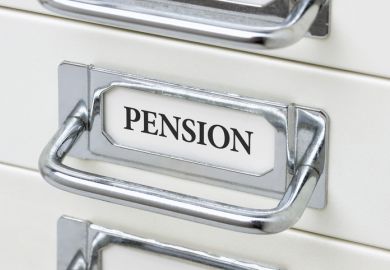The UK’s biggest higher education union has threatened strike action at more than 150 institutions in the run-up to Christmas, as long-running disputes over pensions and pay reach a climax.
The University and College Union said that ballots on walkouts would open on 18 October and run until 4 November, with employers facing “action that will disrupt the end of term and continue into the next one” if they do not return to negotiations with better offers.
UCU will ballot members at 152 institutions in total: 83 over the latest pay offer from employers, for a rise of 1.5 per cent in 2021-22; six over cuts to pensions provided by the Universities Superannuation Scheme; and 63 on both issues.
The National Union of Students has backed industrial action, stating that “students will hold employers responsible” if they do not “come to a negotiated settlement and address the fundamental issues repeatedly raised by staff”.
The strikes, if approved by members, would be the fourth widespread walkout in the sector in little over three years, and would add to the disruption caused by restrictions on face-to-face teaching caused by the coronavirus pandemic.
Jo Grady, UCU’s general secretary, said that university staff had “propped up the entire sector during the pandemic, but they are now being thanked with huge cuts to their pensions, unbearably high workloads, and another below-inflation pay offer – all while universities continue to generate a handsome income from tuition fees”.
“Our members across the UK know that working in a university does not have to be like this and are clear that they are ready to take action to stand up for their dignity, defend pensions and win long-overdue improvements to their pay and working conditions,” Dr Grady said.
“There is still time for university chiefs to resolve a situation that is entirely of their own making, but they must return to negotiations and make credible offers.”
The cuts to USS pension benefits, now approved by the fund’s board but subject to a consultation, will avert a massive hike in employer and employee contributions, but UCU modelling suggests that they could could reduce employees’ guaranteed benefits by as much as 35 per cent, costing members thousands of pounds annually in retirement.
Employers have insisted that their pay offer – which includes additional rises for the lowest-paid staff was “fair and meaningful”. It was implemented on 1 August. But it falls short of UCU’s demand for a £2,500 pay increase.
The union is also calling for renewed action on a range of employment-related issues including workload, casualisation, and equality issues.
Larissa Kennedy, the NUS’ national president, said that students “stand shoulder to shoulder with our educators in fighting for a more just education system”. “Staff working conditions are student learning conditions,” she said.
Employer representatives said that they were “disappointed” by the move for industrial action.
Raj Jethwa, chief executive of the Universities and Colleges Employers Association, said that the pay offer was “fair and meaningful in the context of the sector’s ongoing delicate financial situation” caused by Covid-19.
“HE institutions have relayed to us that the great majority of the 325,000 sector colleagues covered by the collective negotiations understand the financial realities facing their institutions,” Mr Jethwa said.
Universities UK said that the pension reforms would “prevent harmful and unaffordable rises in contributions”.
“Universities are regrettably well prepared to mitigate the impact of any industrial action on students’ learning, and minimise disruption for those staff choosing not to take part,” a spokesman said.
anna.mckie@timeshighereducation.com
UCU strike ballots – who’s voting on what?
USS pension reforms
- Cranfield University
- Imperial College London
- University of Reading
- Ruskin College
- The Institute of Development Studies
- University of Highlands Institute (Scottish Association for Marine Science)
Pay, casualisation, workload and equalities
- Abertay University
- Anglia Ruskin University
- Arts University Bournemouth
- Bath Spa University
- University of Bedfordshire
- Bishop Grosseteste University
- University of Bolton
- Bournemouth University
- University of Brighton
- Buckinghamshire New University
- Canterbury Christ Church University
- Cardiff Metropolitan University
- University of Central Lancashire
- University of Chester
- University of Chichester
- Coventry University
- University of Cumbria
- De Montfort University
- University of Derby
- University of East London
- Edge Hill University
- Edinburgh Napier University
- Falmouth University
- Glasgow Caledonian University
- Glasgow School of Art
- University of Gloucestershire
- University of Greenwich
- Harper Adams University
- University of Hertfordshire
- University of Huddersfield
- Kingston University
- Leeds Arts University
- Leeds Beckett University
- Leeds Trinity University
- University of Lincoln
- Liverpool Hope University
- Liverpool Institute of Performing Arts
- Liverpool John Moores University
- London Metropolitan University
- London South Bank University
- Manchester Metropolitan University
- Middlesex University
- Newman University College
- University of Northampton
- Northumbria University
- Norwich University of the Arts
- Nottingham Trent University
- Oxford Brookes University
- Plymouth Marjon University
- University of Plymouth
- University of Portsmouth
- Queen Margaret University
- Robert Gordon University
- University of Roehampton
- Rose Bruford College
- Royal Academy of Music
- Royal Agricultural University
- Royal Central School of Speech and Drama
- Royal College of Art
- Royal College of Music
- Royal Northern College of Music
- Sheffield Hallam University
- Solent University
- University of South Wales
- St Mary’s University College
- St Mary’s University, Twickenham
- Staffordshire University
- Stranmillis University College
- University of Sunderland
- Teesside University
- Trinity Laban Conservatoire of Music and Dance
- University of the Arts London
- University College Birmingham
- University for the Creative Arts
- University of West London
- University of the West of England
- University of the West of Scotland
- University of Westminster
- University of Winchester
- University of Wolverhampton
- University of Worcester
- Wrexham Glyndŵr University
- York St John University
Both ballots
- University of Aberdeen
- Aberystwyth University
- Aston University
- Bangor University
- University of Bath
- Birkbeck, University of London
- University of Birmingham
- University of Bradford
- University of Bristol
- Brunel University London
- University of Cambridge
- Cardiff University
- City, University of London
- Courtauld Institute of Art
- University of Dundee
- Durham University
- University of East Anglia
- University of Edinburgh
- University of Essex
- University of Exeter
- University of Glasgow
- Goldsmiths, University of London
- Heriot-Watt University
- University of Hull
- Keele University
- University of Kent
- King’s College London
- Lancaster University
- University of Leeds
- University of Leicester
- Liverpool School of Tropical Medicine
- University of Liverpool
- London School of Economics
- London School of Hygiene and Tropical Medicine
- Loughborough University
- University of Manchester
- New York University in London
- Newcastle University
- University of Nottingham
- Open University
- University of Oxford
- Queen Mary, University of London
- Queen’s University of Belfast
- Royal Holloway, University of London
- Royal Veterinary College, University of London
- University of Salford
- Senate House, University of London
- University of Sheffield
- SOAS University of London
- University of Southampton
- University of St Andrews
- St George’s, University of London
- University of Stirling
- University of Strathclyde
- University of Suffolk
- University of Surrey
- University of Sussex
- Swansea University
- Ulster University
- UCL
- University of Wales Trinity Saint David
- University of Warwick
- University of York
Register to continue
Why register?
- Registration is free and only takes a moment
- Once registered, you can read 3 articles a month
- Sign up for our newsletter
Subscribe
Or subscribe for unlimited access to:
- Unlimited access to news, views, insights & reviews
- Digital editions
- Digital access to THE’s university and college rankings analysis
Already registered or a current subscriber?








